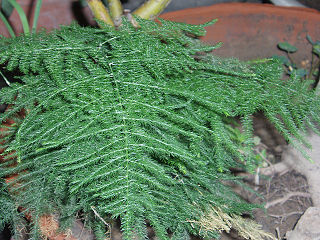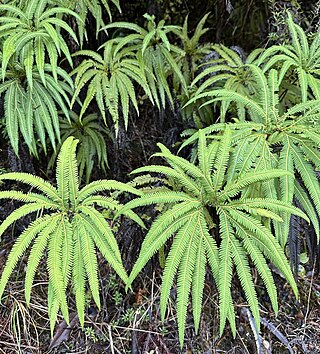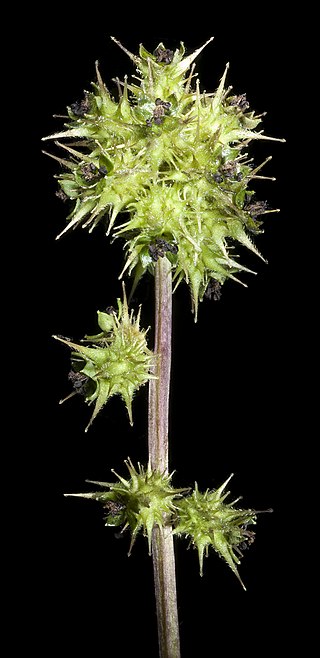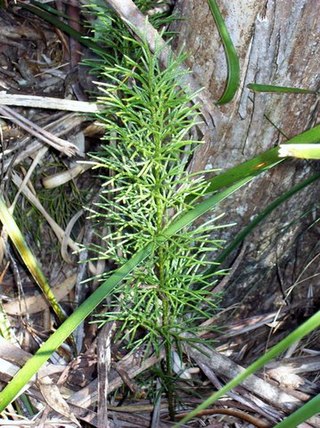
This article relates to the flora of New Zealand, especially indigenous strains. New Zealand's geographical isolation has meant the country has developed a unique variety of native flora. However, human migration has led to the importation of many other plants as well as widespread damage to the indigenous flora, especially after the advent of European colonisation, due to the combined efforts of farmers and specialised societies dedicated to importing European plants & animals.

Asparagus is a genus of flowering plants in the family Asparagaceae, subfamily Asparagoideae. It comprises up to 300 species. Most are evergreen long-lived perennial plants growing from the understory as lianas, bushes or climbing plants. The best-known species is the edible Asparagus officinalis, commonly referred to as just asparagus. Some other members of the genus, such as Asparagus densiflorus, are grown as ornamental plants.

Osmunda regalis, or royal fern, is a species of deciduous fern, native to Europe, Africa and Asia, growing in woodland bogs and on the banks of streams. The species is sometimes known as flowering fern due to the appearance of its fertile fronds.

Asparagus asparagoides, commonly known as bridal creeper, bridal-veil creeper, gnarboola, smilax or smilax asparagus, is a herbaceous climbing plant of the family Asparagaceae native to eastern and southern Africa. Sometimes grown as an ornamental plant, it has become a serious environmental weed in Australia and New Zealand.

Hymenophyllum nephrophyllum, the kidney fern, is a filmy fern species native to New Zealand. It commonly grows on the forest floor of open native bush. Individual kidney-shaped fronds stand about 5–10 cm tall. In hot weather they shrivel up to conserve moisture, but open up again when the wet returns. This species has very thin fronds which are only four to six cells in thickness. In the Māori language they are also called raurenga.

Cyrtomium falcatum is a species of fern, commonly known as house holly-fern and Japanese holly fern, in the wood fern family Dryopteridaceae. It is native to eastern Asia.

The flora of Australia comprises a vast assemblage of plant species estimated to over 21,000 vascular and 14,000 non-vascular plants, 250,000 species of fungi and over 3,000 lichens. The flora has strong affinities with the flora of Gondwana, and below the family level has a highly endemic angiosperm flora whose diversity was shaped by the effects of continental drift and climate change since the Cretaceous. Prominent features of the Australian flora are adaptations to aridity and fire which include scleromorphy and serotiny. These adaptations are common in species from the large and well-known families Proteaceae (Banksia), Myrtaceae, and Fabaceae.

Coprosma repens is a species of flowering shrub or small tree of the genus Coprosma, in the family Rubiaceae, native to New Zealand. Common names include taupata, tree bedstraw, mirror bush, looking-glass bush, New Zealand laurel and shiny leaf.

Calochlaena dubia, commonly known as soft bracken, false bracken, common ground fern or rainbow fern, is a small Australian fern in the treefern family Dicksoniaceae. It is very common within its range, and often seen growing under eucalyptus forest, often on the poorer quality soils. It is an easy plant to grow in the garden.

Gleichenia microphylla is a small fern growing in Australia and New Zealand.

Hymenophyllum flabellatum, the shiny filmy-fern, is a species of fern in the family Hymenophyllaceae. This delicate fern is commonly epiphytic and is between 5 and 25 cm in length. It is distinct, with its thin, one-celled thick, membranous leaves. It is from the family Hymenophyllaceae and is dispersed world wide. The species is dispersed highly throughout Tasmanian rainforests and in the south east of mainland Australia, with small pockets of the population seen in northern Queensland.

Sticherus lobatus, known as the spreading fan fern, is a small fern found in eastern and southern Australia. It is a common and attractive plant, similar to S. flabellatus but with additional lobed segments. It often forms colonies in open forest areas or on the edge of rainforests.

Sticherus is a genus of about 80–90 species of fern.

Lepidosperma laterale, commonly known as the variable swordsedge, is a plant found in south-eastern Australia, New Caledonia, and New Zealand. It is often found on sandy soils or rocky areas in wooded areas.

Sticherus cunninghamii, also known as umbrella fern, is a New Zealand endemic fern.

Acaena echinata, commonly known as sheep's burr, is a species of perennial herb, in the Rosaceae family, native to Australia.

Pseudolycopodium is a genus of lycophyte in the family Lycopodiaceae with only one species, Pseudolycopodium densum, known as the bushy clubmoss. In the Pteridophyte Phylogeny Group classification of 2016, the genus is placed in the subfamily Lycopodioideae. Some sources do not recognize the genus, sinking it into Lycopodium. Pseudolycopodium densum is native to Australia, the North Island of New Zealand and New Caledonia. It is a spore-bearing vascular plant and grows up to a metre high. It is found in a wide variety of situations, often in high rainfall areas on sandy soils.

Sticherus tener, also known as silky fan-fern, is a common native ground-fern in the family Gleicheniaceae. It occurs growing along watercourses and drainage lines in rainforest that are dominated by Nothofagus cunninghamii. In Australia, it occurs in the states of Tasmania and Victoria. In New Zealand, it is known from two disjoint regions on the South Island. Like in other members of this genus, Sticherus tener have bright green fronds with repeatedly forking branches, branches bearing linear-shaped segments at almost right angles to the axis and form umbrella-like bush colony.

Adiantum atroviride, commonly known as maidenhair fern, is a plant in the family Pteridaceae. It is endemic to Australia and occurs in the Northern Territory, Queensland and New South Wales.



















